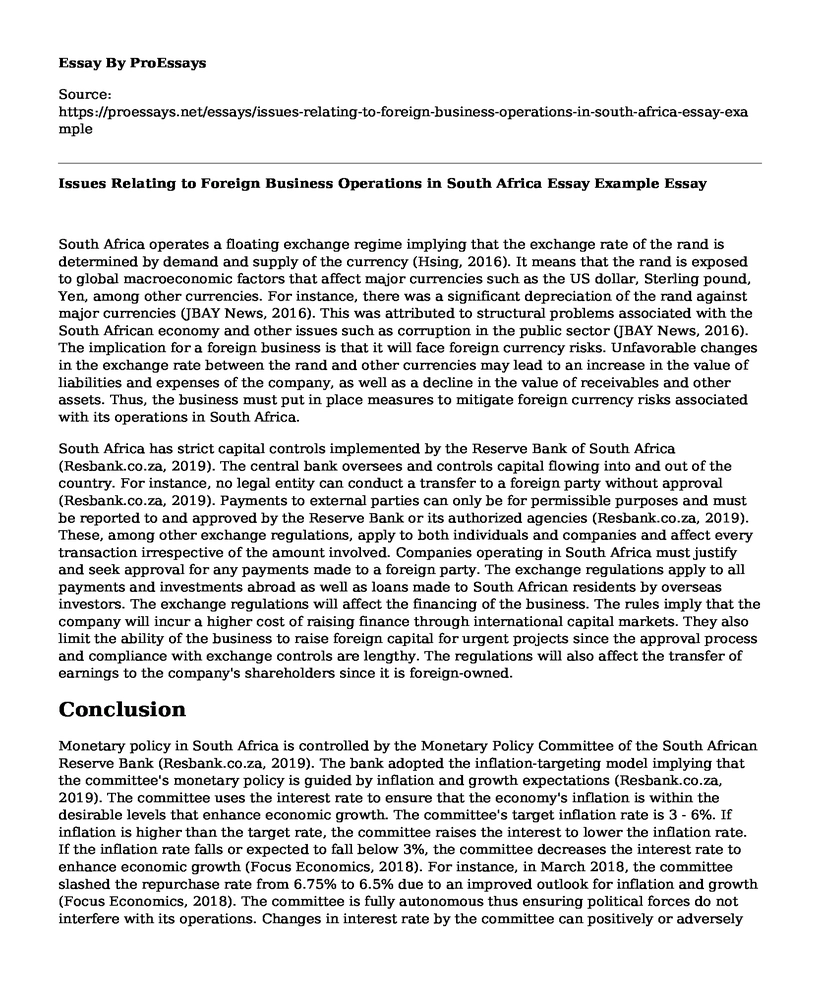South Africa operates a floating exchange regime implying that the exchange rate of the rand is determined by demand and supply of the currency (Hsing, 2016). It means that the rand is exposed to global macroeconomic factors that affect major currencies such as the US dollar, Sterling pound, Yen, among other currencies. For instance, there was a significant depreciation of the rand against major currencies (JBAY News, 2016). This was attributed to structural problems associated with the South African economy and other issues such as corruption in the public sector (JBAY News, 2016). The implication for a foreign business is that it will face foreign currency risks. Unfavorable changes in the exchange rate between the rand and other currencies may lead to an increase in the value of liabilities and expenses of the company, as well as a decline in the value of receivables and other assets. Thus, the business must put in place measures to mitigate foreign currency risks associated with its operations in South Africa.
South Africa has strict capital controls implemented by the Reserve Bank of South Africa (Resbank.co.za, 2019). The central bank oversees and controls capital flowing into and out of the country. For instance, no legal entity can conduct a transfer to a foreign party without approval (Resbank.co.za, 2019). Payments to external parties can only be for permissible purposes and must be reported to and approved by the Reserve Bank or its authorized agencies (Resbank.co.za, 2019). These, among other exchange regulations, apply to both individuals and companies and affect every transaction irrespective of the amount involved. Companies operating in South Africa must justify and seek approval for any payments made to a foreign party. The exchange regulations apply to all payments and investments abroad as well as loans made to South African residents by overseas investors. The exchange regulations will affect the financing of the business. The rules imply that the company will incur a higher cost of raising finance through international capital markets. They also limit the ability of the business to raise foreign capital for urgent projects since the approval process and compliance with exchange controls are lengthy. The regulations will also affect the transfer of earnings to the company's shareholders since it is foreign-owned.
Conclusion
Monetary policy in South Africa is controlled by the Monetary Policy Committee of the South African Reserve Bank (Resbank.co.za, 2019). The bank adopted the inflation-targeting model implying that the committee's monetary policy is guided by inflation and growth expectations (Resbank.co.za, 2019). The committee uses the interest rate to ensure that the economy's inflation is within the desirable levels that enhance economic growth. The committee's target inflation rate is 3 - 6%. If inflation is higher than the target rate, the committee raises the interest to lower the inflation rate. If the inflation rate falls or expected to fall below 3%, the committee decreases the interest rate to enhance economic growth (Focus Economics, 2018). For instance, in March 2018, the committee slashed the repurchase rate from 6.75% to 6.5% due to an improved outlook for inflation and growth (Focus Economics, 2018). The committee is fully autonomous thus ensuring political forces do not interfere with its operations. Changes in interest rate by the committee can positively or adversely affect the operations of the business. The business will have to deal with the implications of interest rate cuts and hikes by the MPC.
References
Focus Economics (2018). South Africa Monetary Policy March 2018: Improving economic outlook gives Central Bank margin to cut rate in March. [online] FocusEconomics. Available at: https://www.focus-economics.com/countries/south-africa/news/monetary-policy/improving-economic-outlook-gives-central-bank-margin-to [Accessed 4 Jan. 2019].
Hsing, Y. (2016). Determinants of the ZAR/USD exchange rate and policy implications: A simultaneous-equation model. Cogent Economics & Finance, 4(1).
JBAY News (2016). Why the South African rand is falling. [online] JBAY News. Available at: https://www.jbaynews.com/why-the-south-african-rand-is-falling/ [Accessed 4 Jan. 2019].
Resbank.co.za (2019). Exchange control legislation - South African Reserve Bank. [online] Resbank.co.za. Available at: https://www.resbank.co.za/RegulationAndSupervision/FinancialSurveillanceAndExchangeControl/Legislation/Pages/default.aspx [Accessed 4 Jan. 2019].
Resbank.co.za (2019). Monetary Policy Committee - South African Reserve Bank. [online] Resbank.co.za. Available at: https://www.resbank.co.za/MonetaryPolicy/Monetary%20Policy%20Committee/Pages/default.aspx [Accessed 4 Jan. 2019].
Cite this page
Issues Relating to Foreign Business Operations in South Africa Essay Example. (2022, Nov 07). Retrieved from https://proessays.net/essays/issues-relating-to-foreign-business-operations-in-south-africa-essay-example
If you are the original author of this essay and no longer wish to have it published on the ProEssays website, please click below to request its removal:
- The Death Penalty in the US - Paper Example
- Paper Example on Challenges Facing Franchises
- Evolution of Policing in America Essay Example
- Essay Sample on Racism in the US: Its Deep Roots and Unfortunate Modern Relevance
- Paper Example on Curbing Healthcare Costs: Debates and Solutions
- Paper Example on Reconstruction in America: Rebuilding After Civil War & WW2
- Free Essay Example on Community Gardens







